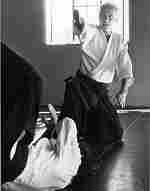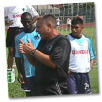Mastery
One of my favorite authors is George Leonard. I was inroduced to him when I was coaching at Cal Berkeley in the late 70's. The other night my son and I were discussing some of the people who played a role in the human consciousness movement. I was telling him about George Leonard, I thought you would be interested in his thoughts on Mastery. To understand his thoughts on Mastery it is necessary to learn a bit about the man.
George Leonard, is the co-founder (with Michael Murphy) of Integral Transformative Practice, and the author of numerous books on human possibilities and social change, including Education and Ecstasy, The Transformation, The Ultimate Athlete, The Silent Pulse, The End of Sex, Mastery, and The Way of Aikido. The 1995 book, The Life We Are Given, co-authored with Esalen founder Michael Murphy, reports on a two-year experimental class in Integral Transformative Practice (ITP) created by the authors for realizing the potential of body, mind, heart, and soul. ITP groups are now practicing not only throughout the U.S., but also in many other countries. The Stanford University School of Medicine has conducted a $500,000 study of the effectiveness of ITP in enhancing health and well-being.
During World War II, Leonard served as a fighter pilot in the southwest Pacific theater, and as an analytical intelligence officer in the Korean conflict. From 1953 to 1970, Leonard served as a senior editor for Look magazine. He produced numerous essays and special issues on education, science, politics, the arts, the Civil Rights Movement, and foreign affairs. A collection of his Look essays was published in 1970 as The Man & Woman Thing and Other Provocations. His articles on education have won eleven national awards. Articles by George Leonard have also appeared in such magazines as Esquire, Harper's, Atlantic, New York, Saturday Review, and The Nation. During the 1980s, he wrote 42 pieces for Esquire, more than any other writer.
 Leonard holds a 5th degree black belt in the martial art of aikido, and is co-fouder of an aikido school in Mill Valley, California. He is founder of Leonard Energy Training (LET), a practice inspired by aikido which offers alternative ways of dealing with everyday life situations. Leonard has introduced LET to more than 50,000 people in the U.S. and abroad.
Leonard holds a 5th degree black belt in the martial art of aikido, and is co-fouder of an aikido school in Mill Valley, California. He is founder of Leonard Energy Training (LET), a practice inspired by aikido which offers alternative ways of dealing with everyday life situations. Leonard has introduced LET to more than 50,000 people in the U.S. and abroad.
In 1977 Leonard created the The Samurai Game a leadership and team-building intensive where participants form two teams and are asked to assume the role of a 16th century Samurai. The game then evolves into a series of challenges where participants compete against each other while learning to recognize the principles and values in which they lead and participate.
George Leonard received a Bachelor of Arts degree from the University of North Carolina (1948) and Doctor of Humanities degrees from Lewis and Clark College (1972), John F. Kennedy University (1985), and the Saybrook Institute (2003). He is a past president of the Association for Humanistic Psychology; during his tenure, the Association's membership reached its all-time high. Currently, he is president emeritus of Esalen Institute. Leonard’s adventures along the human frontiers of the 1960s are described in his 1988 memoir, Walking on the Edge of the World. He is married and has four daughters and six grandchildren.
George Leonard has been called "the granddaddy of the consciousness movement," by Newsweek, "the poet-philosopher of American health in its broadest sense" by American Health, and "the legendary editor and writer" by Psychology Today. While serving as senior editor for Look magazine from 1953 to 1970, he won an unprecedented eleven national awards for education writing. His coverage of the Civil Rights Movement (praised in the February 10, 2003 New Yorker) contributed to Look’s being awarded the first National Magazine Award in 1968. His harrowing 20,000-mile journey around the Soviet border with photographer Paul Fusco just after the Berlin Wall went up provided the first reportage showing that the Iron Curtain was an actual barrier of barbed wire, mine fields, and watchtowers rather than a mere figure of speech.
In a sense, Leonard discovered the Sixties. While other media were still decrying the silent or cautious generation, he produced a special Look issue called "Youth of the Sixties: The Explosive Generation" (Jan. 3, 1961) which foretold the idealism and turmoil to come. His special issue on California (Sept. 25, 1962) was the first to put forth the thesis (later adopted by all media, to become conventional wisdom) that what happened in that state would happen later throughout the nation. In the 1960s, Look had a readership of 34 million and won more national awards for excellence than any other magazine.
Leonard coined the term "human potential movement" and first used the term "The Transformation" in a book of that title to describe a shift in the way industrial culture deals with matter and energy, organizes social forms, and shapes consciousness. His bestselling 1975 book, The Ultimate Athlete, helped shape the fitness boom. His 1983 book, The End of Sex (the cover article for the December 1982 Esquire) was the first published requiem for the sexual revolution.
His scenarios for interactive multimedia education in Education and Ecstasy and Esquire are still considered state of the art by educational technologists. Dr. Alfred Bork of the Educational Technology Center at the University of California, Irvine has stated that "Many of the features that Leonard describes seem to me likely to characterize almost any school of the future that uses computers effectively as tools for learning."
Leonard’s more recent books, Mastery (1991), The Life We Are Given (1995, with Michael Murphy), and The Way of Aikido (1999) have helped create a nationwide movement towards long-term practice, as opposed to the quick-fix mentality. According to the San Francisco Chronicle, "Leonard has been right so many times about prevailing zeitgeists that you have to wonder if he has a third eye."
He also enjoys a lifelong devotion to music and occasionally plays piano with jazz groups. He wrote the music for a full-scale musical comedy, Clothes, based on "The Emperor’s New Clothes," which was produced as Marin County’s Mountain Play.
Retrieved from "http://en.wikipedia.org/wiki/George_Burr_Leonard"
 The following are the five steps of mastery from his book Mastery:
The following are the five steps of mastery from his book Mastery:
SURRENDER TO YOUR PASSION
“How can I describe the kind of person who is on a path to mastery? First, I don't think it should be so dead serious. I think you should understand the joy of it, the fun of it. Being willing to see just how far you can go is the self surpassing quality that we human beings are stuck with. Evolution is a whole long story of mastery. It's being real. It's being human. It's being who we are.”
PRACTICE, PRACTICE, PRACTICE
“I started Aikido at age 47, got my first black belt at 52. In the process, I learned what this business of mastery is all about. For example, it once was thought that talent was absolutely important. The Greeks talk about this “divine spark.” That's why you can become great.”
–George Leonard
GET A GUIDE
“What if you're practicing wrong? Then you get very good at doing something wrong. If we don't get good instruction, then we don't notice when it's a little out of round. Surrender yourself to your teacher. That's doesn't mean you turn over your life to the teacher - you don't want a guru. You have to keep the autonomy within yourself. You are finally the ultimate authority on your own practice. ”
VISUALIZE THE OUTCOME
"Now here is a key: you want to make it real and present in the realm of your consciousness. You don't say “I'm going to do such and such” - it already has happened. Now, is consciousness real? It exists and it is very powerful. The idea is to have this mesh between your consciousness - your visualization - and the so-called material world.”
PLAY THE EDGE


1 Comments:
Personally, I've never been a big fan of the humanistic psychology movement. I think they spend too much time in the metaphysical, and don't find it very practical on a day to day basis. In the 80's I was fortunate to hear Albert Ellis speak & do his Cognitive Behavioral Therapy. I enjoy his books.
Post a Comment
<< Home